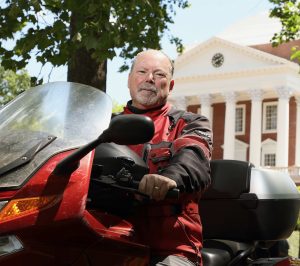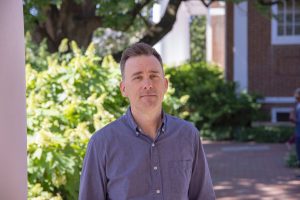The University of Virginia School of Data Science (SDS) has adopted Open Access Guidelines and Recommendations for its faculty members to follow in sharing their research. The move was recommended by the school’s Academic Affairs Committee and approved by the dean of SDS on Feb. 3.
The guidelines call on faculty to make all scholarly articles, papers, books, data, and software openly available, free of charge in formats that allow reuse. It acknowledges the value of transparency in driving innovation so scholars can build upon each other’s research and accelerate science. The hope is that others on campus will follow the lead of SDS and the guidelines will be embraced more broadly.
“We are intent on pushing this forward at the institutional level,” said Phil Bourne, founding dean of the SDS. “We’ve made this first step. Now we are committed to helping move the university in the right direction.”
Development of the guidelines was a collaborative effort that goes back six months under leadership of Bourne and Brandon Butler, director of information policy at the UVA library. Coming to UVA three years ago from the National Institutes of Health where he led the Big Data Knowledge Program, Bourne bought a commitment to starting a data science program built on the principles of open.
“I got into this as a researcher and became an advocate for Open Access,” said Bourne, a bioinformatician who spent 20 years on the faculty at the University of California-San Diego. “Data science would not exist if not for open content.”
Butler and Bourne first drafted the guidelines using the open access policy at Harvard University as a model, then expanded and localized it to fit the needs of UVA.
“We expect faculty to not just deposit articles, but to make every research product as open and available and usable as possible,” said Butler, noting that evolving standards will help people to find formats that are machine readable and select licenses that allow for interoperability. “We don’t specify these things in the guidelines, because we want it to be relatively future-proof. The school and the library will work together to help faculty choose formats and licenses that meet evolving standards and expectations for openness.”
One factor that eased the way for adopting the new guidelines was that UVA has had a copyright ownership policy in place for many years in which the university retains a license to make non-commercial uses of all scholarly works produced by employees of the university. This enabled the SDS to invoke the university’s existing rights rather than create a new license as part of its Guidelines and Recommendations.
As for the process? An initial version of the guidelines was developed by a subcommittee of the SDS Academic Affairs Committee and presented to the provost, and then reviewed by the university counsel’s office. The revised guidelines were returned to the subcommittee for review. The subcommittee granted approval. Then the Academic Affairs Committee gave its final recommendations on Feb. 3.
Cooperation between the SDS and the Library was critical in crafting the language and moving it along through the university.
Faculty are being asked to take one more step with their work and Butler said the library is positioned to do all it can to make the process easy.
Bourne said the library will be integral in helping faculty members use its institutional repository, Libra. “It’s one thing to have guidelines, but if faculty can’t easily comply, they are useless,” he said.
The success of SDS relies on data being available, so from the beginning there was a commitment to making data available to others in the same way. When the school was established, it drew faculty who already had an interest in open practices.
The SDS also has a promotion and tenure policy that is in alignment with the OA guidelines. Faculty won’t be considered for advancement until they provide evidence that they have indeed complied with the OA requirements. “It’s baked in to provide an incentive – otherwise, it’s so easy to ignore,” Bourne said.
Clearly communicating to interested faculty that open is valued and weaving incentives to work in open into the advancement process connects with the mission of the Roundtable on Realigning Incentives for Open Science, sponsored by National Academy of Sciences Engineering and Medicine. Bourne said competition drives academics and he’s all for sharing the process at UVA with others through the roundtable or other avenues.
Next at UVA, the guidelines are expected to be shared with the UVA Faculty Senate. The hope is that something similar could be endorsed for use throughout the university. Whatever happens at the institution level, individual disciplines or schools will be free to adopt or adapt the model SDS has developed.
Before embarking on a similar path, Butler suggests looking at the policy landscape that already exists on your campus and finding a place to get a foothold for expanding open. Also, it’s important to customize guidelines to fit the local needs of an institution or a school. To gain traction, there must be an effort to show faculty the advantage of operating in the open.
“It’s an educational process,” said Bourne. “It’s making it simple, being clear and direct.”
The guidelines support the mantra of the school: “Data science for societal benefit,” Bourne said. “That’s everything we are about. To maximize the societal benefit of our work, we need openness and transparency.”

